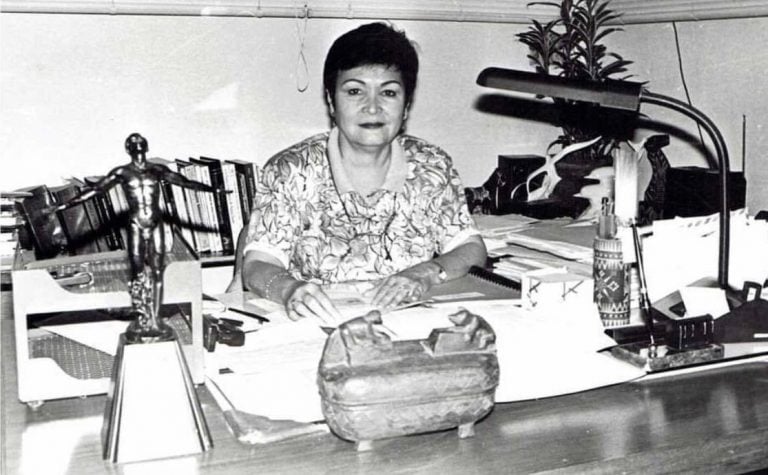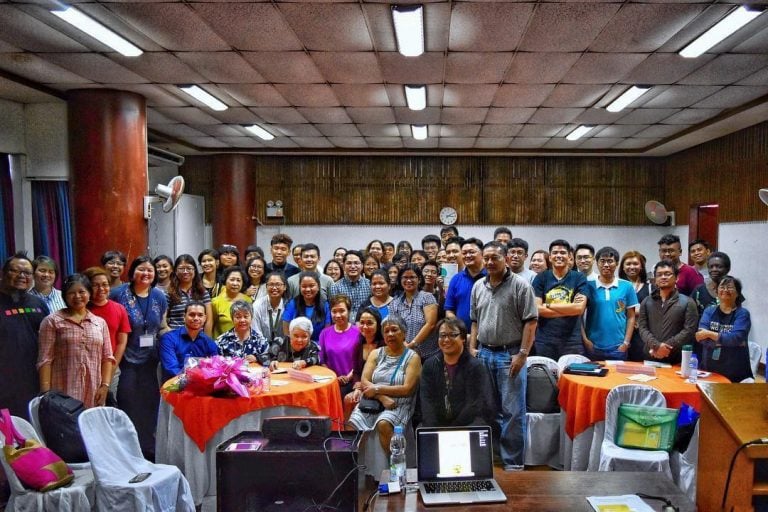By Francisco V. Gargantiel II

The University of the Philippines (UP) mourns the death of former Professor of Linguistics
Consuelo M. Joaquin Paz, who passed away on September 15, 2022. She is regarded as the
“Grand Dame of Philippine Linguistics” for her published works on historical and
comparative linguistics, sociolinguistics, and ethnolinguistics.
Dr. Paz’s journey with UP began when she earned various academic degrees from UP Diliman, starting with her Bachelor of Arts in English 1953), Master of Arts in Linguistics in 1967), and her Ph.D. in Linguistics 1978. During her studies, she took on different leadership roles for other academic groups that led to her becoming Chair of the Department of Linguistics for two terms and Dean of the UP Diliman’s College of Social Sciences and Philosophy, also for two terms, from 1992 to 1998. She also helped establish two research centers: Programa sa Pag-aaral ng Etnolinggwistikong Grupo (Program for the Study of Ethnolinguistic Groups) and the Center for International Studies (CIS).
Dr. Paz earned her title as the “Grand Dame of Philippine Linguistics” thanks to her unparalleled contributions to Philippine linguistics and culture studies. She is considered a pillar of modern Philippine linguistics and a force in establishing and advancing Filipino as the national language. Her written work, A Reconstruction of Philippine Phonemes and Morphemes, is considered a milestone in Philippine diachronic linguistics. Many of her articles, such as “The Effects of Language on Social Structures: The Philippine Multilingual Scene,” “The nationalization of a Language: Filipino,” and “A Multidisciplinary Study of Stigma in Relation to Hansen’s Disease Among the Tausug,” were published in international academic journals.
To say that Dr. Consuelo J. Paz has left a lasting impact on the Philippines is an understatement. Thanks to her body of work in the field of historical linguistics, sociolinguistics, ethnolinguistics, and cultural studies, we have enriched our knowledge of our language and culture, as well as the promotion of distinct Philippine languages and dialects.
Dr. Paz’s journey with UP began when she earned various academic degrees from UP Diliman, starting with her Bachelor of Arts in English 1953), Master of Arts in Linguistics in 1967), and her Ph.D. in Linguistics 1978. During her studies, she took on different leadership roles for other academic groups that led to her becoming Chair of the Department of Linguistics for two terms and Dean of the UP Diliman’s College of Social Sciences and Philosophy, also for two terms, from 1992 to 1998. She also helped establish two research centers: Programa sa Pag-aaral ng Etnolinggwistikong Grupo (Program for the Study of Ethnolinguistic Groups) and the Center for International Studies (CIS).
Dr. Paz earned her title as the “Grand Dame of Philippine Linguistics” thanks to her unparalleled contributions to Philippine linguistics and culture studies. She is considered a pillar of modern Philippine linguistics and a force in establishing and advancing Filipino as the national language. Her written work, A Reconstruction of Philippine Phonemes and Morphemes, is considered a milestone in Philippine diachronic linguistics. Many of her articles, such as “The Effects of Language on Social Structures: The Philippine Multilingual Scene,” “The nationalization of a Language: Filipino,” and “A Multidisciplinary Study of Stigma in Relation to Hansen’s Disease Among the Tausug,” were published in international academic journals.
To say that Dr. Consuelo J. Paz has left a lasting impact on the Philippines is an understatement. Thanks to her body of work in the field of historical linguistics, sociolinguistics, ethnolinguistics, and cultural studies, we have enriched our knowledge of our language and culture, as well as the promotion of distinct Philippine languages and dialects.

With every commencement exercise in UP that features the UP sablay, the UP community
remembers Dr. Paz, who was pivotal in making the sablay, the traditional sash worn by UP
graduates. According to UP Diliman Professor of English and Comparative Literature Jose
Wendell Capili: “Not many people know that, as Chair of the UP Diliman College Council
Committee on Academic Personnel and Management (1990), she initiated the shift from
traditional caps and gowns to Filipiniana with a malong/patadyong-like material draped on
one shoulder.”
“The result is wearing the sablay, not only in UP but in many schools, colleges, and universities across the country. UP Diliman’s College of Arts and Letters (CAL) and the College of Social Sciences and Philosophy (CSSP) first wore the Sablay as part of the graduation attire during their respective college recognition rites in 1991,” Capili wrote in a Facebook post.
The University is very thankful for the life and contributions of Dr. Consuelo J. Paz, and we aim to reach newer heights using her works as the foundation of something bigger.
“The result is wearing the sablay, not only in UP but in many schools, colleges, and universities across the country. UP Diliman’s College of Arts and Letters (CAL) and the College of Social Sciences and Philosophy (CSSP) first wore the Sablay as part of the graduation attire during their respective college recognition rites in 1991,” Capili wrote in a Facebook post.
The University is very thankful for the life and contributions of Dr. Consuelo J. Paz, and we aim to reach newer heights using her works as the foundation of something bigger.
